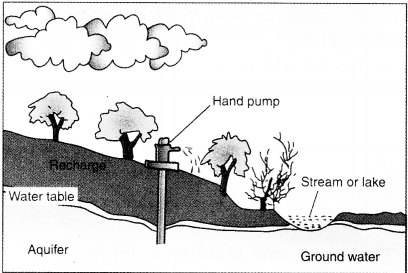NCERT Solutions for Class 7 Science Chapter 16 Water: A Precious Resource are part of NCERT Solutions for Class 7 Science. Here we have given NCERT Solutions for Class 7 Science Chapter 15 Light.
| Board | CBSE |
| Textbook | NCERT |
| Class | Class 7 |
| Subject | Science |
| Chapter | Chapter 16 |
| Chapter Name | Water: A Precious Resource |
| Number of Questions Solved | 9 |
| Category | NCERT Solutions |
NCERT Solutions for Class 7 Science Chapter 16 Water: A Precious Resource
Question 1.
Mark ‘T if the statement is true and F’ if it is false:
(а) The freshwater stored in the ground is much more than that present in the rivers and lakes of the world. (T/F)
(b) Water shortage is a problem faced only by people living in rural areas. (T/F)
(c) Water from rivers is the only source for irrigation in the fields. (T/F)
(d) Rain is the ultimate source of water. (T/F)
Answer:
(a) T
(b) F
(c) F
(d) T
Question 2.
Explain how groundwater is recharged?
Answer:
The rainwater and water from other sources such as rivers and ponds seeps through the soil and fills the empty spaces and cracks deep below the ground. The process of seeping water into the ground is called infiltration. The groundwater thus gets recharged by this process.
Question 3.
There are ten tube wells in a lane of fifty houses. What could be the long-term impact on the water table?
Answer:
A huge amount of water will be pumped out from these ten tube wells and it will result in the depletion of the groundwater. Consequently, the water table will go deeper and deeper with time and in the longer-term, it will affect the availability of water in that area.
Question 4.
You have been asked to maintain a garden. How will you minimize the use of water?
Answer:
The use of water can be minimized by:
- using drip irrigation.
- preventing the leakage in the drains in the delivery pipes.
- filling the burrows of snakes and rats.
- protecting the boundaries of the field from breakage.
Question 5.
Explain the factors responsible for the depletion of the water table.
Answer:
There are three main causes of depletion of the water table.
(i) Increasing population:
The increasing population creates demand for the construction of houses, shops, offices, roads, and pavements. This decreases the open areas like parks and playgrounds. This, in turn, decreases the seepage of rainwater into the ground. Moreover, a huge amount of water is required for construction work. Often groundwater is used for this purpose. So, on the one hand, we are consuming more groundwater whereas, on the other hand, we are allowing lesser water to seep into the ground. This results in depletion of the water table.
(ii) Increasing industries:
Water is used by all industries. Almost everything that we use needs water somewhere in its production process. The number of industries is increasing continuously. Water used by most industries is drawn from the ground.
(iii) Agricultural activities:
A majority of farmers in India depend upon rains for irrigating their crops. Irrigation systems jUcîi Cl’îs equals are there only in a few places. Even these systems may suffer from a lack of water due to erratic rainfall. Therefore, farmers have to use groundwater for irrigation. The increased use of groundwater day by day results in depletion of the water table.
Question 6.
Fill in the blanks with the appropriate answers:
- People obtain groundwater through ……. and ……….
- Three forms of water are …….,……. and ……….
- The water-bearing layer of the earth is ………..
- The process of water seepage into the ground is called ………..
Answer:
- tubewells, hand pumps
- solid, liquid, gas
- aquifer
- infiltration
Question 7.
Which one of the following is not responsible for water shortage?
(i) Rapid growth of industries
(ii) Increasing population
(iii) Heavy rainfall
(iv) Mismanagement of water resources
Answer:
(iii) Heavy rainfall.
Question 8.
Choose the correct option.
The total water
(i) in the lakes and rivers of the world remains constant
(ii) under the ground remains constant
(iii) in the seas and the oceans of the world remains constant
(iv) of the world remains constant.
Answer:
(iv) of the world remains constant.
Question 9.
Make a sketch showing the groundwater and water table. Label it.
Answer:

We hope the NCERT Solutions for Class 7 Science Chapter 16 Water: A Precious Resource help you. If you have any query regarding NCERT Solutions for Class 7 Science Chapter 16 Water: A Precious Resource, drop a comment below and we will get back to you at the earliest.